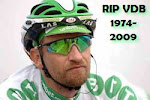 Dawn Richardson writes, "An open dialogue about the problem of doping has been, up to this point, the third rail of cycling. Touch it and you die. The culture insists that anyone wishing to continue working in the sport remain silent on the issue, which perpetuates the problem.
Dawn Richardson writes, "An open dialogue about the problem of doping has been, up to this point, the third rail of cycling. Touch it and you die. The culture insists that anyone wishing to continue working in the sport remain silent on the issue, which perpetuates the problem.But the tide appears to be turning. Team managers and riders are not being immediately fired for admitting a prior history of doping in the era before EPO testing. Breaking the silence is a huge step towards solving the problem. As the biggest names in the sport are falling, the anti-doping movement seems to be throwing a haymaker at the doping culture.
Sadly, doping continues, but its hold on cycling and other sports is weakening. UCI, WADA and USADA are catching dopers, and these successes are beginning to dictate team management. The culture is shifting away from the two most common doping models: the "if you ain't cheatin', you ain't tryin'" doping infrastructure within a team or a "don't ask, don't tell" obliviousness. The most innovative management approach is medical testing within the team structure itself to discourage doping, as takes place at T-Mobile, or Slipstream's third-party testing through the Agency for Cycling Ethics.
For team physicians who wish to work ethically, doping is our worst nightmare. Team doctors aren't cops or lawyers, nor should we be. Our job is to keep the athletes healthy so they can perform to the best of their natural ability. As ethical anti-doping physicians our influence and expertise should be used to prevent doping through education and intervene when we encounter it. Some of us are organizing our efforts in these areas and others as the American Association of Cycling Team Doctors.
But in order to help solve the problem of doping, I figured I first had to understand it. So I went straight to the source - to reformed dopers themselves, some caught and some not, some active and some retired..."
Full article, "Ask the Doctor: The surprising dual toll of doping" By Dawn M. Richardson, MD, FACEP, here:
http://velonews.com/train/articles/12396.0.html





No comments:
Post a Comment
Pappillon welcomes your comments and encourages your participation. Comments may, however, be moderated.